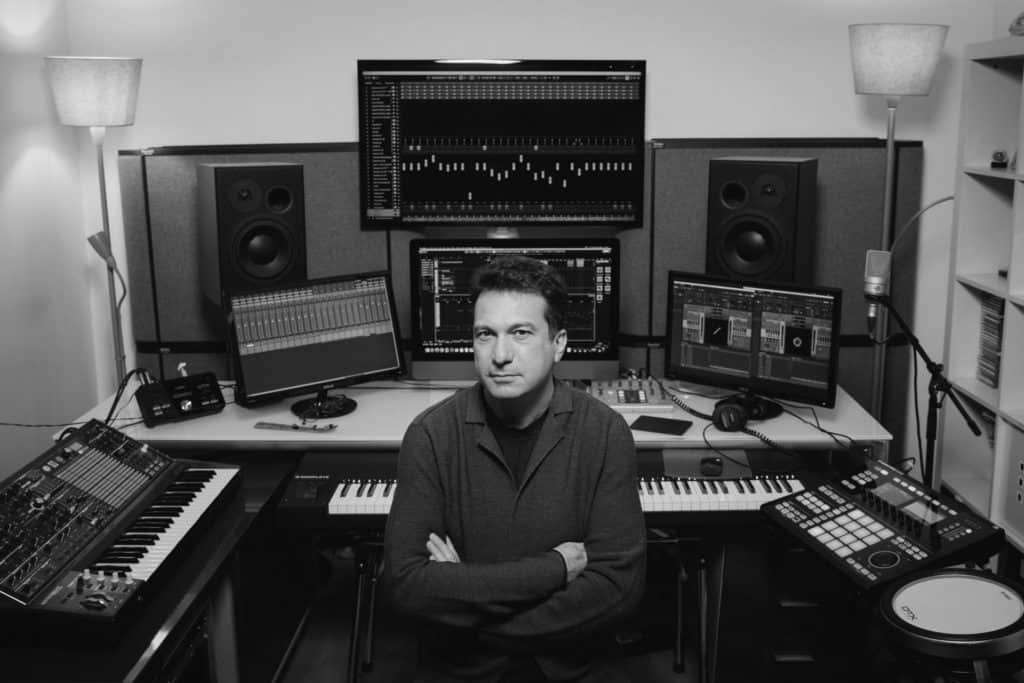
I recently had the pleasure of sending a handful of questions to famed Italian composer Paolo Buonvino. We talk in-depth about his score to the 2020 historical drama Fatima, which tells the story of the 1917 Our Lady of Fátima events in Portugal.
Paolo has scored dozens of films and tv shows, both within Italy and beyond. He’s probably most well known internationally for scoring the hit Netflix series Medici. Paolo has received numerous awards and nominations internationally, including winning the Rota Soundtrack Award at the Venice Film Festival in 1998 for Come te nessuno mai.
Continue below to read about Paolo’s latest score, Fatima, his broader approaches to film music, and his thoughts about Italian film music (among other things!).
Find out more about Paolo on his website. Fatima is currently streaming on Netflix while Paolo’s score (and many of his other works) is available on all major streaming platforms, including Spotify.
Note: We originally discussed conducting an audio/video interview. However, we determined that the language barrier may have proved an obstacle to the interview. As a result, we opted for an email-based Q&A. To preserve the original intent of Paolo’s answers, I have not edited or adjusted these translations (other than the most minor of punctuation changes).
The Intersection Between Religion and Music in Fatima
The Film Scorer: Given Fatima has a strong Catholic focus, an obvious choice for the score would have been to lean heavily into this, but you chose not to.
Paolo Buonvino: I was hoping to deliver exactly this message – that this music can communicate a wide and integrated religious concept. Religion should not be something exclusive, but a way to feel love and to love others.
The Film Scorer: Did the religious nature of the film affect your scoring process or how you wanted the music to affect the film?
Paolo Buonvino: In telling the specific point of view of this story I tried to express humankind’s relationship with the divine, beyond the differences in religions. With Fátima, we dug into the relationship between humans and spirituality and the concept of a miracle – but not in the shape and form of a religion’s belonging to one person or group.
With my music, I wanted to express the narrative of this movie in three different ways. The first one is essentially giving the audience the chance to live that dimension that belongs to Lúcia and the other kids witnessing the apparition and to get into their world made of simplicity and purity of the soul – a purity that leads them to see something extraordinary. The second aspect that I focused on was to show the energy and joy that one can feel when experiencing such a dimension of purity. And finally, also about our fear to be happy and to go beyond the ordinary lives that we lead.
The Film Scorer: Much of your score is quite sober and restrained, with a handful of repeating themes and musical motifs. Can you talk about some of those themes and motifs?
Paolo Buonvino: I chose melodies that are very sober and simple to try to induce in the listener a meditative sensation of calm. A sort of soul’s “silence,” to dim that emotional uproar that sometimes prevents us to listen to the divine that lies within ourselves. The kids, protagonists of the story, have this interior calm, and this purity at heart lets them see what others can’t see.
But in the soundtrack, you will also find melodies that are inspired by the beauty of the vision of the Holy Mary that I wanted to represent utilizing some polyrhythms that are apparently chaotic but that harmonize one with the other. These are the polyrhythms of nature and also of those complex and yet wonderful relationships between us people.
The Film Scorer: What was your approach to scoring the film and how was your working relationship with director Marco Pontecorvo?
Paolo Buonvino: With the director, we wanted to tell a story that could go beyond the hagiographic description, and that could explore the pure point of view of the kids from the inside. This dimension of purity and simplicity had to belong also to my musicians. That’s why, before each execution, I would ask them to enter a meditative mental space and to keep that emotional attitude throughout the playing.
The Film Scorer: Did this approach differ from how you normally score films? Do you have one typical method or preference when it comes to scoring (e.g. working from the script, working from the locked film, improvising on a piano, etc.)?
Paolo Buonvino: Yes, it was different, because this soundtrack was first of all an opportunity for me to be inspired and to enjoy that meditative dimension I’m talking about, a sense of purity and simplicity that I was yearning for. And I hope that I transmitted that to the audience. For what concerns my method, I think that each time I have a different approach. In this case, I started writing the score before watching the images from the movie, and more than on the screenplay I formed my idea by constantly confronting myself with the director. On the screenplay, you can read the action of a story, but the deep senses behind the scenes are delivered in the creative act of the director. When I watched the movie, I adapted those musical sensations and themes that inspired me to specific scenes. Sometimes I abstract myself from the movie to produce something that could go beyond what I watch and that later, pairing up with the images, like in a magical, alchemical process, it sublimes and adds value to the narration.
The Film Scorer: One of the highlights of the score is the song “Gratia Plena,” which features Italian opera tenor Andrea Bocelli. It plays during the film’s end credits and provides a powerful bookend to Fatima. How did you compose the song and how did you work with Andrea Bocelli?
Paolo Buonvino: The theme of the movie was naturally suggesting to think about a prayer dedicated to the Holy Mary, and so to the Ave Maria (Hail Mary). But I didn’t want to fall into the temptation of proposing this hymn once again, as it has been interpreted so many times in wonderful masterpieces throughout the history of music. So, I tried to find my different way of paying homage to the prayer by utilizing only the incipit of the Ave Maria and to let that be sung by a children’s choir in different languages. The children sang the incipit in their native languages but not only: they also learned each other’s languages. The kids’ choir then pairs, through the musical model of the canon, with senior voices as well as with Andrea Bocelli’s melodic line. This is because “Gratia Plena” is a hymn to the kids’ purity inspired by the kids of the story, and it is a universal invitation to be united, to brotherhood. It wants to be a joyous dance embracing the world beyond cultural and religious differences. The kids also invite the senior voices and Andrea Bocelli to become like kids, to go back to that dimension and rediscover their purity of soul.
I thought of Andrea Bocelli as a sort of big brother who guides the kids’ choir, but they also guide him, to rediscover his inner child. My encounter with Bocelli was extraordinary, he loved the song from the get-go, and we found an immediate connection not just musically but also on the human level. We shared similar ideas on spirituality and the universal message of the song. His interpretation is brilliant, capable of masterfully combining his emotional depths with his world-known virtuosity.
Italian Film Music
The Film Scorer: Although you primarily work on projects in Italy, you’ve also scored film and television throughout Europe and North America. Do you believe that there is a different approach to scoring for film and television depending on the country? Do Italian composers have a different mindset compared to those in the US or UK, for instance?
Paolo Buonvino: Yes, there are some differences, but they are not substantial. Music speaks a universal language, and the directors, producers, commissioners of a movie have always the same goal, to touch the audience’s emotional chords through the images and the music.
For what concerns, specifically, Italian music for film, I believe that a difference is probably in that big artisans’ tradition that belongs to our country. I say that because, although we are utilizing the most avant-garde technologies, we still love to work in an analogic mode, at least in the intentions, in the instinct, and the creative act of making music.
In my specific case, being a Sicilian composer, I can say that my music is also very contaminated, multiethnic, and multilayered. It has to be because of the history of Sicily, an island situated in the center of the Mediterranean Sea that, throughout history, has been conquered by so many different populations, from North Europe to the Middle East. It comes naturally to us to speak different musical languages where a Balkan melody can join an Arab one sounding perfectly in unison.
The Film Scorer: Most of my audience is in the US and UK, where Ennio Morricone is of course the most well-known Italian composer. Others may be familiar with names like Nino Rota and horror/Giallo fans may know composers like Goblin, Claudio Simonetti, and Fabio Frizzi. Who are other Italian composers (besides yourself!), past or present, that you think the rest of the world should be familiar with?
Paolo Buonvino: Definitely Ezio Bosso, an extraordinary musician and a man of rare and refined sensibility who recently passed away. He needs to be acknowledged and celebrated more.
Paolo’s Next Projects
The Film Scorer: Are there any upcoming projects that you’re currently working on?
Paolo Buonvino: I’m working on two TV series, one for the Italian channel Sky, and one for Netflix, and also on a personal project where orchestrated music will communicate and duet with an artificial intelligence. It is an avant-garde project that wants to explore new horizons and new ways to make music.
I want to thank Paolo again for taking the time to answer a few questions. It was a pleasure and I hope to talk with him again one day soon!
